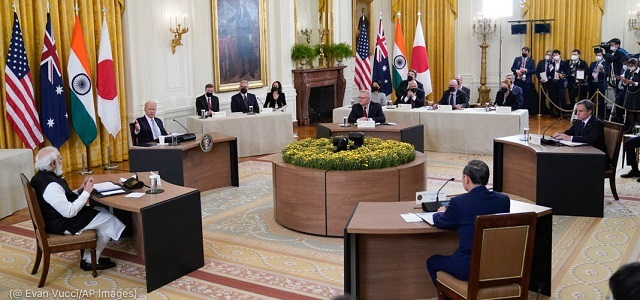Australia, India, Japan and the United States are strengthening cooperation through their Quad partnership to tackle pressing challenges in the Indo-Pacific and beyond.
“We are four major democracies with a long history of cooperation,” President Biden said while hosting the first in-person Quad Leaders’ Summit at the White House September 24. “We know how to get things done, and we are up to the challenge.”
Biden, along with Australian Prime Minister Scott Morrison, Indian Prime Minister Narendra Modi and Japanese Prime Minister Yoshihide Suga, announced recent progress in fighting COVID-19, the climate crisis and other challenges, as well as new initiatives to improve understanding between the people of the Indo-Pacific nations.
The leaders launched a new Quad Fellowship that invites students from the four countries to pursue graduate studies in science, technology, engineering and math fields in the United States. The fellows will travel to each of the four Quad countries to meet with top scientists, innovators and politicians.

President Biden hosted the first in-person Quad Leaders’ Summit at the White House September 24. Participants included Indian Prime Minister Narendra Modi, Australian Prime Minister Scott Morrison, Secretary of State Antony Blinken and Japanese Prime Minister Yoshihide Suga. (© Evan Vucci/AP Images)
The Quad partnership works to advance democratic values and rules-based order in the Indo-Pacific. At the summit, Biden said the four democracies share a common world view and vision for the future.
The Quad’s recent progress addressing global challenges includes:
- COVID-19: The partnership is expanding COVID-19 vaccine manufacturing to produce at least 1 billion doses in India by the end of 2022. The nations have delivered nearly 79 million safe and effective vaccine doses to the Indo-Pacific region, part of a pledge to donate more than 1.2 billion doses globally.
- Climate change: The leaders announced a new green shipping network that will promote environmentally friendly port infrastructure and seek to decarbonize the shipping value chain, including by establishing two to three low- or zero-emission shipping corridors by 2030.
- Emerging technologies: The Quad is working to advance diverse, resilient and secure fifth-generation telecommunications systems. In a new statement of principles, the leaders announced plans to advance emerging technologies with a respect for democratic values and human rights.
- Infrastructure: Since 2015, Quad countries have provided more than $48 billion in infrastructure financing to the Indo-Pacific region. The leaders launched an infrastructure coordination group that will support development of transparent, high-quality projects that support local communities and meet environmental standards.
- Cybersecurity: A new Quad senior cyber group will convene government and industry experts from the four countries to drive improvements, including shared standards, secure software and trustworthy digital infrastructure.
- Space: Quad leaders began discussions on space cooperation with an agreement to share satellite data to monitor climate change, prepare for disasters and better use ocean resources.
In a joint statement, the Quad leaders committed to working with a range of partners to secure a safer and more prosperous future.
“At a time that tests us all, our commitment to realize a free and open Indo-Pacific is firm, and our vision for this partnership remains ambitious and far-reaching,” the leaders said.
Banner image: President Biden met with the leaders of Australia, India and Japan during the first in-person Quad Leaders’ Summit in Washington September 24. (© Evan Vucci/AP Images)







COMMENTS0
LEAVE A COMMENT
TOP